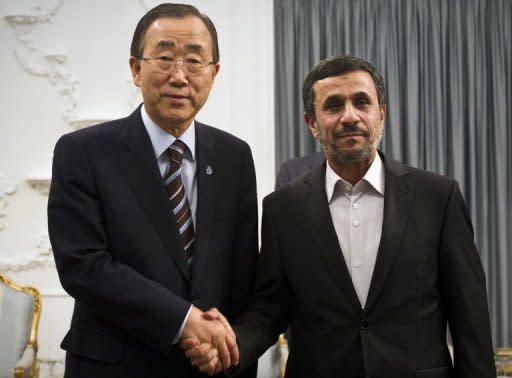UN chief talks nuclear standoff, Syria with Iran
UN chief Ban Ki-moon on Wednesday held talks with Iran's leaders on its nuclear activities, the Syria conflict and human rights ahead of a summit at which Tehran aims to boost its international standing. Ban met with the Islamic republic's supreme leader Ayatollah Ali Khamenei after separately seeing President Mahmoud Ahmadinejad and parliament speaker Ali Larijani, Iranian media said. After his meeting with Larijani, Iran's parliamentary news website quoted Ban as saying: "We have concerns about the human rights situation in Iran... Also I will discuss the nuclear issue with the Islamic Republic of Iran officials." He said "Iran can play an important role in solving the Syrian crisis peacefully," adding that "the Syrian people have suffered a lot ... with more than 20,000 dying in the past 18 months." Larijani, for his part, said "unfortunately, some big countries have acted adventurously in the region and have created disruption in the region like what we are witnessing in Syria." Iran, the chief ally of Syria's regime, accuses the United States, Turkey, Saudi Arabia and Qatar of sustaining the armed revolt in Syria. The UN chief was to leave on Friday, after attending the two-day summit of the 120-member Non-Aligned Movement. The United States and Israel had criticised Ban's presence at the summit, even though the NAM represents nearly two-thirds of UN member states. That has led Iran to seize upon Ban's attendance as a victory over its enemies and a sign it is not as isolated on the international scene as the United States has claimed. Iran is locked in a deepening showdown with the United States and the rest of the UN Security Council over its disputed nuclear programme. It has also been threatened with possible Israeli air strikes on its nuclear facilities. The West fears the programme is aimed at developing a nuclear weapons break-out capability. Iran denies that, insisting its atomic activities are exclusively peaceful. The UN's nuclear watchdog, the International Atomic Energy Agency, is expected to release its latest report on Iran's nuclear programme this week -- perhaps coinciding with the NAM summit. The report is likely to highlight Iran's expanding uranium enrichment activities -- which the Security Council has repeatedly demanded be suspended -- and Tehran's refusal to allow IAEA inspectors into a military site, Parchin, suspected of hosting explosives tests for nuclear warhead designs. On Wednesday, the IAEA moved to create a special Iran "task force" to scrutinise the country's implementation of its nuclear obligations and its compliance with IAEA and Security Council provisions.



